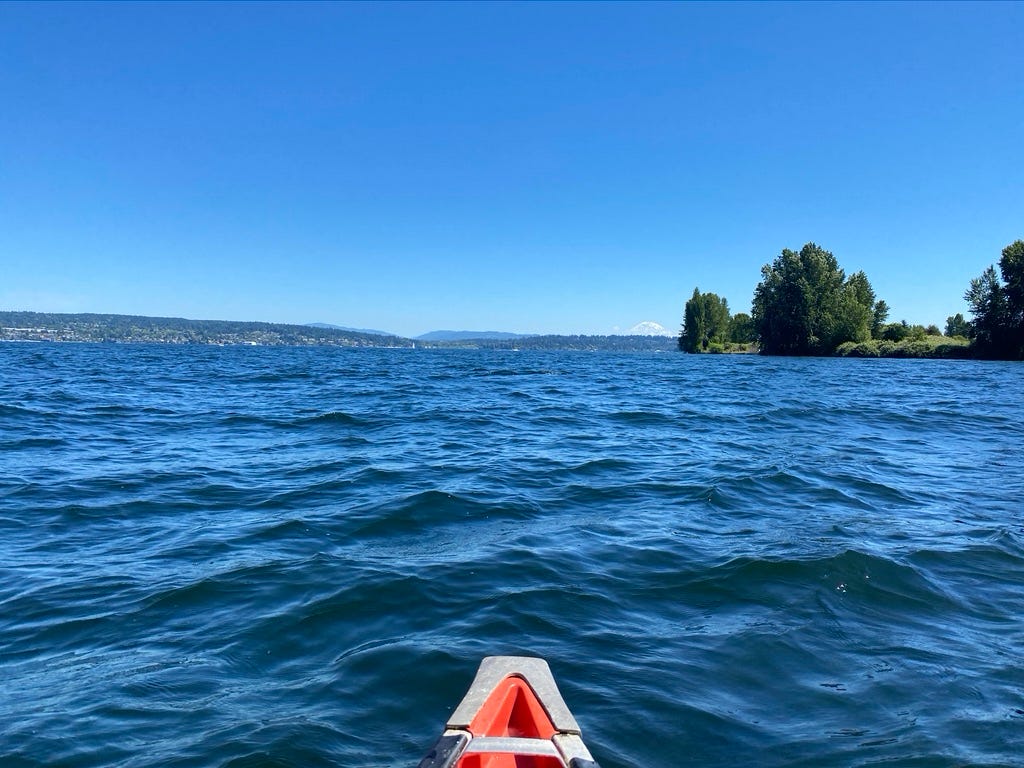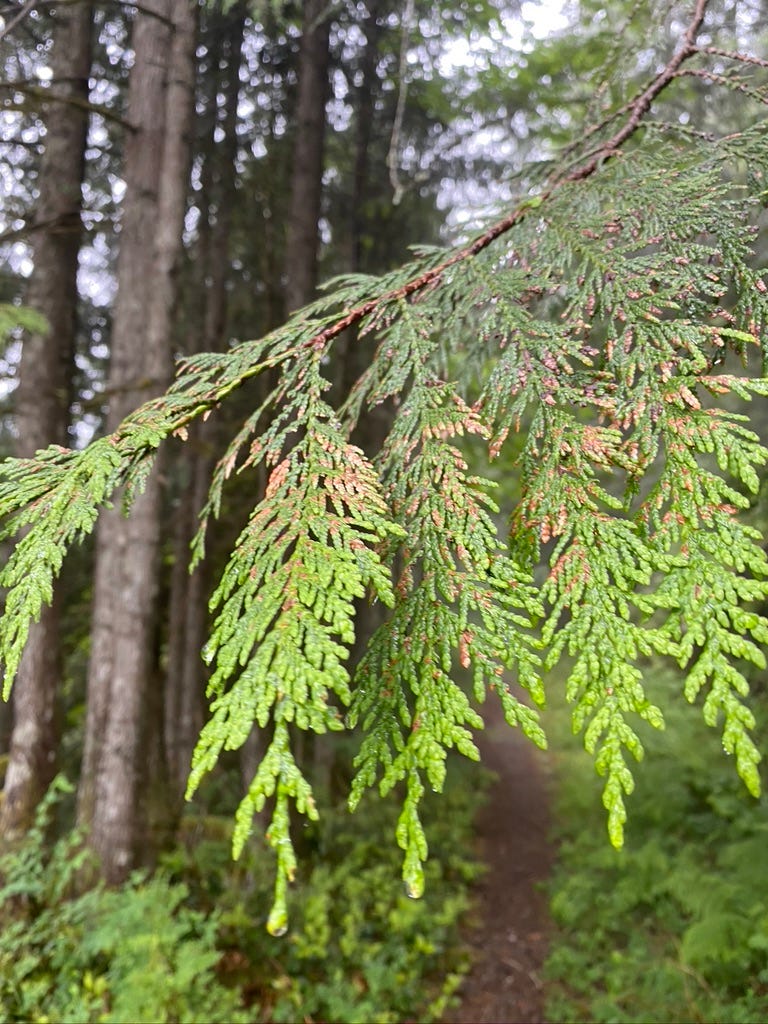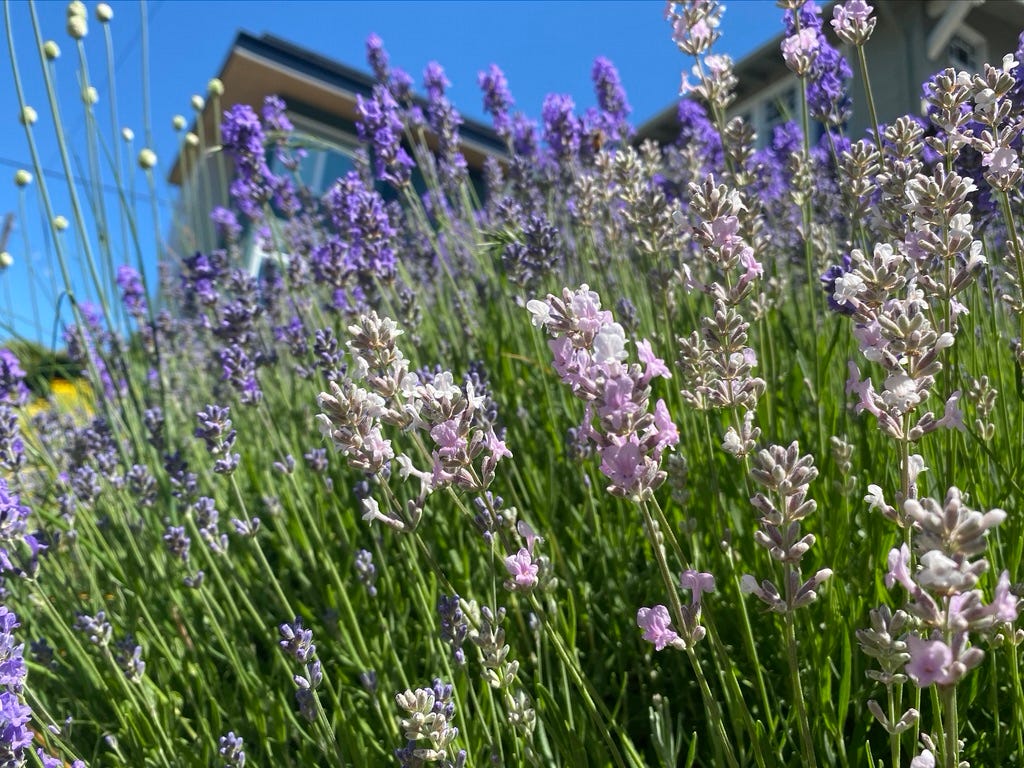In the past week or so, Seattle’s infamous “Juneuary” weather has finally turned summery again, bringing to bear a lot of things I care about all at once.
The hummingbirds are back in my neighborhood in full force. They’ve emptied out our large feeder in the course of a few days, courteously making their minute raygun pewpewpews each time they come by so my wife and I can admire them. That they exist at all feels nothing short of miraculous. If you need a season-long dopamine boost for like $10 I can’t recommend highly enough that you get a feeder and keep an eye on it.
On top of that the blackberry blossoms are bursting forth again, a harbinger of my favorite time of year, when you can walk down half the streets in Seattle and feast on what is in my humble estimation the best fruit in existence. The blossoms themselves, when dried, make a great component of homemade teas, but I try not to harvest too many since it’s the blossoms that eventually become the berries. It’d be an own-goal to clear them out early.
New cedar tips are coming in, too, growing in deep and subtle gradients, as opposed to the new fir needles which grow whole new bright green bunches. Before I learned to forage for these things I never noticed that. Evergreens were just evergreens, fading into an uninteresting background that had nothing on the deciduous trees with their broad fluttering leaves. Strange, how our priorities can affect our eyeballs.
What all of this has made me realize is that the act of noticing can become part of the act of faith. In the days when I didn’t pay attention to these trees I was missing bright signs of spring and summer, signs that at points in my life I have sorely needed. You might quibble with the word faith here, I don’t know—we certainly have enough data to prove the demarcation of the seasons, so believing in them hardly requires the type of spiritual grit that other types of faith do. But all the same: in the long literal and figurative winters of my years on Earth, I have clung to the hope and promise of spring like a life raft. The season itself has always been promised, of course, but any of us being around to see it is not. And so now, each time the firs and spruces sprout their bright green tips, and each time the cedars flourish their new colors and shapes, it will appear to me as a sign of faith rewarded: that I have made it to another set of the seasons that hold these unique joys.
These ideas remind me of a guy I follow on Twitter, who—in a circumstance that a lot of us who flirt with irony can recognize—accidentally became an unironic heliotheist by joking around about it.
As is the case with a lot of things in my life there’s a line from a Jason Isbell song that also feels appropriate to the themes I’ve been unpacking here. It’s from his song “Flagship,” the superior version of which comes from his Live from the Ryman album (which is the case for every song on that album, it should be said).
You gotta learn to keep yourself naive
In spite of all the evidence believed
And volunteer to lose touch with the world
And focus on one solitary girl
Baby let's not live to see it fade
I'll cancel all the plans I've ever made
I'll drive and you can ride in the back seat
We'll call ourselves the flagship of the fleet
Before these particular meditations I only ever read that first couplet one way—that committing to love requires a certain willful naivete, an act of pretending that so many other things don’t matter or won’t happen so that you can give yourself over to it fully. Otherwise you might let all the what-ifs suffocate you before you ever gave love a chance.
Now I see a second possibility: that it can be important to remain willfully naive about a whole host of things so that you keep your sense of wonder about them, even when the reasons for their existence are solid and concrete and knowable. Twitter user @sixangryghosts up there shows that he is aware to some degree of the chemical makeup of the sun, the reactions and forces and things that keep it hot and spinning. But are those details really as important as the sheer miracle that it is there, hot enough and spinning just right enough to create life here on Earth, all these millions of miles away? Can the How of the sun’s existence ever be as meaningful as its much less answerable Why?
The growth of plants and the coming of warm seasons exist in that same place for me. I have looked at my fair share of plant diagrams, labeled with their xylems and phloems and pistils and stamens and so on. I have a rudimentary understanding of the stoichiometry required to accurately describe photosynthesis; if I put my head to it I can reason through why different types of plants need different types of soil. But none of that matters to me in the way that it matters to know that we are surrounded at all times by beings who can transmute sunlight and rain and dirt into life. And not just some cheap version of it, either. With three ingredients these things make dazzling colors and food and shade and building material. They exhale oxygen for us to breathe! The chemical and biological mechanics of respiration don’t matter a wit to me when placed next to the miracle of our coexistence with these things. I have enough gray matter left that I could learn these concepts more minutely, probably. But I find joy in keeping myself naive enough to appreciate them on the level of the miraculous.
One last anecdote to drive home the value of a little willful naivete: My wife and I took our dog canoeing for the first time over the weekend. It was important to us to take this step with her, as we both love getting out on the water and have made it our mission, as pet parents, to try to have our dog exist with us as an expansion of our joys rather than a restriction on them.
It was an anxious trip for all of us. Orla couldn’t really settle herself down, and so neither could we, choppy as the water was on that windy Saturday. Every minute or two she would turn and lean to the opposite side of the canoe, sometimes propping up her paws on the gunwales and leaning over the edge. As anyone who has spent time in canoes can tell you, weight distribution and balance are pretty much everything; even minor adjustments can swamp you if you’re not careful.
Our anxieties are occasionally self-fulfilling prophecies. If she’d just sat still—if she’d been able to pretend that there was nothing to worry about—then she’d have had nothing to worry about. With a relaxed dog we could have kept complete control over the canoe and so kept her safe. Instead, her half-frantic dashing around created the very threat she was afraid of.
We never did end up swamping, but there were some very close calls. As it is with canoeing, so it is with love and nature and faith. A little naivete can go a long way to prevent you from drowning in all the wrong things.
Thanks, as always, for reading. I’ll talk to you next week.
-Chuck
PS - If you liked what you read here, why not subscribe and get this newsletter delivered to your inbox each week? It’s free and always will be.









This made me think of a recent realization that, while trivial, is yet another in the onslaught of things I have finally made space in my brain for learning/questioning/understanding. The arrival of spring in CNY brings, as you know, gazillions of robins (alas, no hummingbirds, yet). I was watching one recently hopping all over the yard and feasting on worms. And I thought, how do robins know where the worms are? Smell? Sight? Invisible divining rods? (I never see worms on the surface of the grass, and of course we can't smell them except when they pull a major lemming move on the street after a heavy rain). Here's the thing, and it maybe it relates to preserving naiveté, at least for a while: I could just google it and get an answer in a few seconds, but for now I don't want to know! I'd rather watch them a while longer and see if I can make an educated guess. It's probably a very obvious answer, but I never paid much attention in science classes. On how robins get the worm, I want to be naive (and ignorant) just a bit longer.